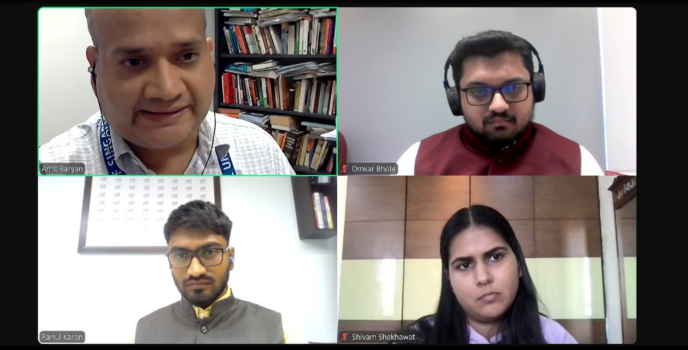The Organisation for Research on China and Asia (ORCA) and Nepal Institute for International Cooperation and Engagement (NIICE) successfully co-hosted a webinar on the topic, “Balancing Public Perception with Strategic Realities in Nepal Amidst India-China Competition” on April 24, 2025 from 4:00 PM to 5:30 PM as a part of ORCA-NIICE research partnership.
Watch the Full Video Here
The webinar delved into several crucial dynamics of India-Nepal relations such as the impact of public perception in Nepal in its foreign policy decisions, significance of Nepal’s balancing act, India’s public diplomacy and development cooperation efforts in the wake of growing Chinese engagements in Nepal.
The opening remarks were presented by the moderator Mr. Rahul Karan Reddy, who highlighted the significance of connectivity infrastructure as a key vector of influence as South Asia remains one of the most infrastructure-stressed regions globally. He noted gaps in connectivity and trade facilitation affect not only economic prospects but also politics, diplomacy, and livelihoods. He emphasized the importance of public perception surveys as people’s sentiments play a crucial role in foreign policy decisions. He argued infrastructure cooperation by India and China enhances regional integration and is a strategic tool, with Nepal skilfully navigating influences through hedging and multi-alignment.
Mr. Omkar Bhole spoke on “Emerging India-China Dynamics in Nepal: Insights from a Public Perception Survey,” presenting observations from a public perception survey conducted in Nepal. He noted that Nepali people generally have higher expectations from India due to deep cultural, emotional, and historical ties. However, unmet expectations lead to discontent and anti-India sentiments, politically leveraged and expressed through pro-China alignments. He added that economic opportunities from India, especially in employment, have grown in significance, and issues like the Agnipath scheme impact sentiments. He recommended better management of public sentiment, improved transparency during crises, and enhanced visibility of development efforts. In further remarks, he also briefly commented on the implications of recent protests in Nepal on its foreign policy.
Dr. Amit Ranjan elaborated on “The China Factor in India’s Public Diplomacy in Nepal.” He addressed the evolving role of perception and misperception in shaping foreign policy, particularly within South Asia, and emphasized how domestic politics and public sentiment increasingly influence international relations. He observed that regional politics often shape policies toward neighbors in India. Regarding Nepal, he noted public perception shifted after the 1989 blockade and 2015-16 crisis, pushing Nepal to strengthen engagement with China. He assessed that foreign policy must be backed by public support and suggested India make policies more regionally acceptable, noting an opportunity as U.S. aid pauses.
Ms. Shivam Shekhawat spoke on “Prospects of India's Development Diplomacy in Nepal and the BRI Challenge,” highlighting that India-Nepal relations are founded on cultural affinity, open borders, and strong people-to-people ties. She argued that India’s High Impact Community Development Projects have enhanced its visibility and goodwill at the grassroots level. She also highlighted challenges posed by China’s Belt and Road Initiative, which has shifted towards soft infrastructure and public diplomacy. Discussing projects like the Kerung-Kathmandu Railway, she emphasized shared challenges such as terrain, environmental concerns, and land access. She recommended that India maintain consistent engagement and address bottlenecks to strengthen trust.
Dr. Deepak Prakash Bhatt spoke on “Changing Dynamics of Nepal's Balancing act between India and China,” emphasizing Nepal's unique position between two rising powers, paralleling Mongolia’s situation between Russia and China. He stressed that India-Nepal relations are historically resilient and not easily measured by aid or monetary figures. Despite trade imbalance and project delays, ties with India remain crucial across culture, society, and security. He noted China's growing development presence is limited by geography and nature. Rather than a zero-sum view, he advocated Nepal benefit from both powers, suggesting Nepal boost economic activities and balance trade while engaging strategically.
Presentations by the speakers were followed by an interactive Q and A Session, during which audience members presented various questions to the speakers. The Q and A Session was followed by Closing Remarks presented by the moderator highlighting India’s way forward for navigating the China challenge in Nepal. Mr. Bibek Dhoj Thapa, Programme Coordinator and Research Associate, NIICE, gave a Vote of Thanks to all speakers and participants.
Read ORCA's Reports based on Public Perception Surveys conducted in Kathmandu in April 2023 and January 2025:
- A Survey of Public Opinion in Nepal: India and China in Competition by Senior RA Rahul Karan Reddy
- Balancing the Himalayan Neighbours: Unpacking Nepal's Public Perception of India and China by Senior RA Omkar Bhole


